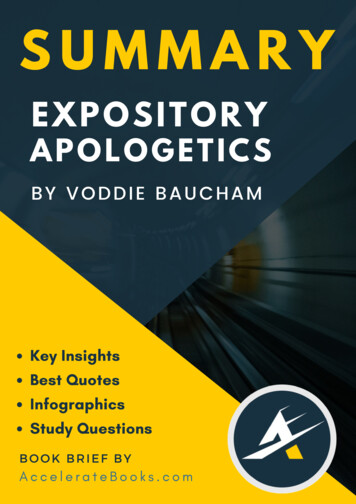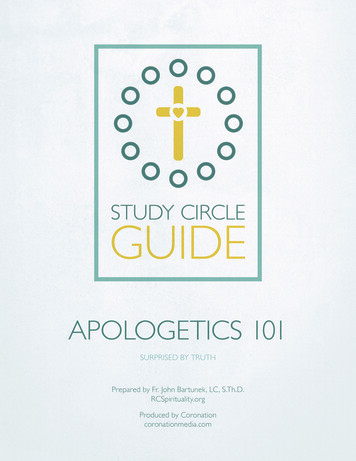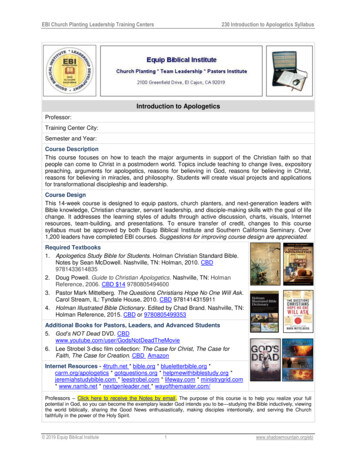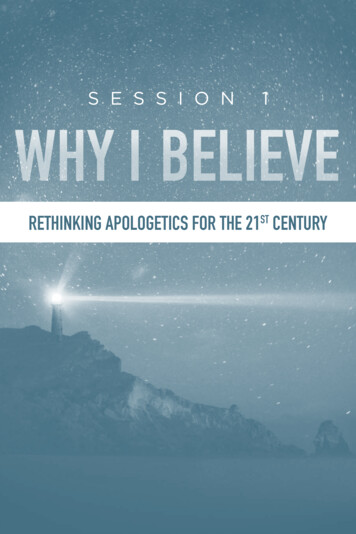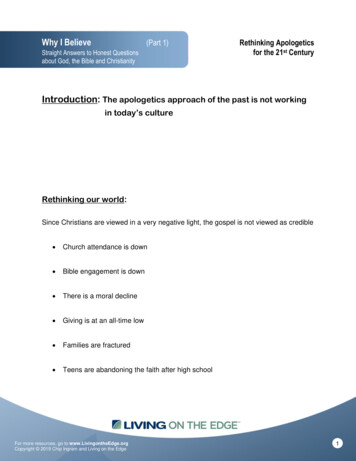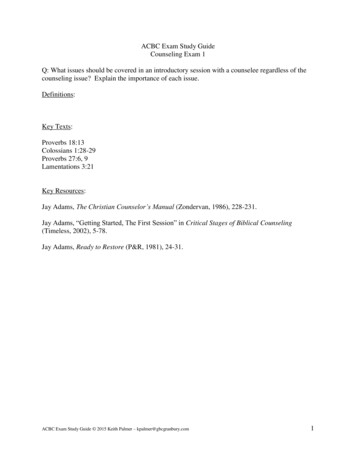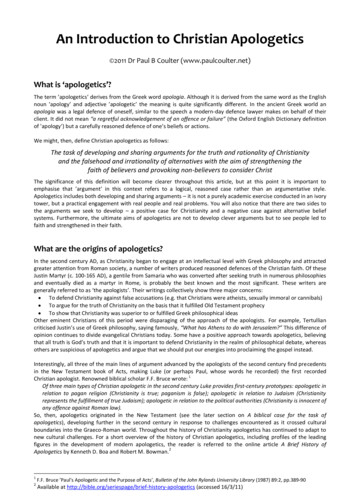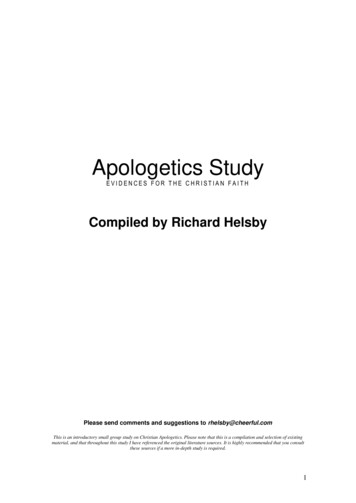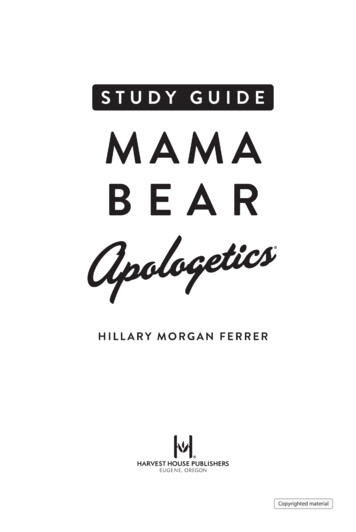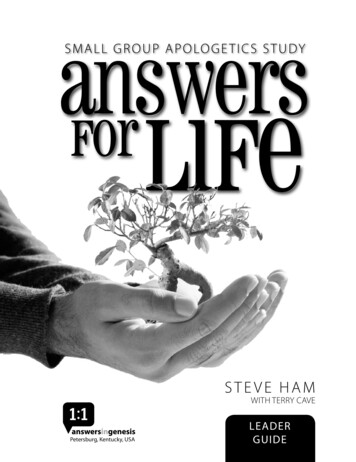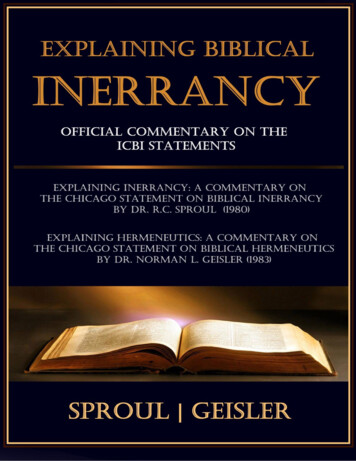
Transcription
1
Explaining Biblical Inerrancy:Official Commentary on the ICBI Statements2013Explaining Inerrancy: A Commentary on the Chicago Statementon Biblical InerrancyBy Dr. R.C. Sproul1980Explaining Hermeneutics: A Commentary on the ChicagoStatement on Biblical HermeneuticsDr. Norman L. Geisler19832
Explaining Biblical Inerrancy: Official Commentary on the ICBI StatementsPublished by:Bastion BooksP.O. Box 1033Matthews, NC 28106http://BastionBooks.comEdited by Norman L. Geisler and Christopher T. HaunCopyright 2013 Norman L. Geisler. All rights reserved.No portion of this e-book may legally be copied, reproduced or transmitted in any form and byany means, electronic or mechanical, including photocopying, digital or analog recordings, or byany information storage and retrieval system, without permission in writing from Norman L.Geisler or Bastion Books. However, the following rights are hereby granted only for the legalowner of this e-book: (1) You may store a copy of this e-book file may be stored in safe andunshared location as a backup in case the original is lost to electronic malfunction or theft. (2)You may place a copy of this e-book file on two electronic devices that you own. (3) Thepurchaser of this e-book may print one paper hard copy and replace that hard copy when it isdiscarded due to wear, lost, or stolen. (4) Properly attributed quotations of 100 words or lesswith clear citations is considered “fair use.” (5) Pastors and teachers may purchase one copy ofthe e-book and share it in digital form with their students so long as this e-book is being used as aprimary text book and no financial profits are made. Redistribution of this e-book beyond theselimits could result in legal action. Other requests regarding the use of this material may be madeby postal mail or by emailing Permissions@BastionBooks.com.3
CONTENTSIntroduction.6The Chicago Statement on Biblical Inerrancy: Articles of Affirmation and Denial (1978) . 15The Chicago Statement on Biblical Hermeneutics: Articles of Affirmation and Denial (1982) . 18Explaining Inerrancy: A Commentary on the Chicago Statement on Biblical Inerrancy . 22Foreword by Roger R. Nicole . 22The Word of God and Authority . 24ARTICLE I: Authority. 25ARTICLE II: Scripture and Tradition . 27The Word of God and Revelation. 28ARTICLE III: Revelation . 29ARTICLE IV: Human Language . 30ARTICLE V: Progressive Revelation . 32The Word of God and Inspiration . 33ARTICLE VI: Verbal Plenary Inspiration . 34ARTICLE VII: Inspiration . 36ARTICLE VIII: Human Authors . 37The Word of God and Inerrancy. 38ARTICLE IX: Inerrancy . 39ARTICLE X: The Autographs . 41ARTICLE XI: Infallibility . 43ARTICLE XII: Inerrancy of the Whole . 44The Word of God and Truth . 46ARTICLE XIII: Truth . 47ARTICLE XIV: Consistency . 51ARTICLE XV: Accommodation . 53The Word of God and You . 55ARTICLE XVI: Church History . 56ARTICLE XVII: Witness of the Spirit . 57ARTICLE XVIII: Interpretation . 59ARTICLE XIX: Health of the Church . 614
Explaining Hermeneutics: A Commentary on the Chicago Statement on Biblical Hermeneutics . 63ARTICLE I: Authority of the Scriptures. 63ARTICLE II: The Written Word And the Incarnated Word . 64ARTICLE III: The Centrality of Jesus Christ . 65ARTICLE IV: The Role of the Holy Spirit in Revelation . 66ARTICLE V: The Role of the Holy Spirit in Application . 66ARTICLE VI: Propositional Truth Correponds to Realty . 67ARTICLE VII: One Meaning, Multiple Applications . 68ARTICLE VIII: Cultural Universality . 69ARTICLE IX: Hermeneutics and Meaning . 70ARTICLE X: Adequacy of Variety of Literary Forms . 71ARTICLE XI: Adequacy of Translation. 72ARTICLE XII: Limits for Functional Equivalence Translation . 73ARTICLE XIII: The Value and Limits of Genre Criticism . 74ARTICLE XIV: Literary Forms and Factual History . 75ARTICLE XV: The Grammatical-Historical Sense . 76ARTICLE XVI: Roles and Varieties of Biblical Criticism . 77ARTICLE XVII: Scripture is Self-Interpreting . 78ARTICLE XVIII: Meaning may Transcend Human Understanding . 79ARTICLE XIX: Danger in Preunderstandings. 80ARTICLE XX: Extrabiblical Sources. 81ARTICLE XXI: Harmony of General and Special Revelations . 82ARTICLE XXII: Genesis 1-11 as Factual . 83ARTICLE XXIII: Perspicacity of the Scriptures . 84ARTICLE XXIV: The Value of Biblical Scholarship. 84ARTICLE XXV: Preaching as Exposition of Scriptural Texts . 855
INTRODUCTIONIt is a fact of human experience that when the living eye-witnesses to events die off, theprocess of developing myths about these events is often accelerated.1 So, as one of the threeliving framers of the Chicago statements on inerrancy and hermeneutics, it seemed good to putthe first two statements and their official commentaries in one inexpensive and universallyaccessible source.Four Fundamental ICBI DocumentsThere were four ICBI documents on the meaning of inerrancy: (1) The ChicagoStatement on Biblical Inerrancy (by the ICBI drafting committee, 1978); (2) The Commentary onthe Chicago Statement on Biblical Inerrancy, by Dr. Sproul; (3) The Chicago Statement onBiblical Hermeneutics (by the ICBI drafting committee, 1982); (4) The Commentary on theChicago Statement on Biblical Hermeneutics, by Dr. Geisler. These four documents arereproduced here.2Dr. R. C. Sproul was not just a signer of the three ICBI statements. He was also theoriginal framer of the affirmations and denials of the Chicago Statement on Biblical Inerrancy,the president of the ICBI during its tenure, and the author of the official commentary on theChicago Statement on Biblical Inerrancy. This booklet was titled Explaining Inerrancy: ACommentary (International Council on Biblical Inerrancy: 1980). It has been reproduced herewith the gracious permission of Ligonier Ministries and Dr. Sproul.Dr. Norman Geisler, was a signer of the ICBI statements, a member of the ICBI draftingcommittee, the general editor of all the books published by ICBI, and the author of the officialbooklet explaining the second Chicago Statement. That booklet was titled Explaining1See: Norman L. Geisler and William C Roach, Defending Inerrancy: Affirming the Accuracy of Scripture for aNew Generation (Grand Rapids: Baker Books, 2011).2This book only contains the heart of the first and second Chicago statements, the articles of affirmation and denial.The summary statements and the excellent short expositions that are normally included in those statements have notbeen included here. The full statements can be viewed at .6
Hermeneutics: A Commentary on the Chicago Statement on Biblical Hermeneutics (InternationalCouncil on Biblical Inerrancy: 1983). It has also been reproduced here in this book.Other Important ICBI BooksIn addition, official ICBI books were produced on these two Statements. On the firstStatement (1978), the book titled Inerrancy, ed. Norman L. Geisler (Zondervan, 1979) wasproduced, consisting of chapters by ICBI conference scholars. Also, there was Hermeneutics,Inerrancy, and the Bible (Zondervan, 1984) edited by Earl Radmacher and Robert Preus,consisting of papers from the ICBI hermeneutics summit in 1982. Gordon Lewis and BruceDemarest put together, Challenges to Inerrancy: A Theological Response (Moody Press, 1984).Another ICBI book on the meaning of inerrancy was produced titled Biblical Errancy: AnAnalysis of Its Philosophical Roots, ed. Norman L. Geisler (Zondervan, 1981). The final book ofthe ICBI series was on the application of inerrancy. It was edited by Kenneth S. Kantzer andtitled Applying the Scriptures (Zondervan, 1987).Why the ICBI View on Inerrancy is So ImportantAs evangelicals we recognize that no extra-biblical statements or creeds are infallible.Only the Bible is infallible. Nonetheless, some doctrinal statements are very important. TheICBI statements fall into this category for many reasons. First, it stands in continuity with thehistoric orthodox view on Scripture (see John Hannah, Inerrancy and the Church, Moody, 1984).Second, it was put together by an international group of some 300 evangelical scholars, not by anindividual or mere handful of persons. Third, it has been adopted (in 2003) as a guide inunderstanding inerrancy by the largest group of evangelical scholars in the world, TheEvangelical Theological Society. Fourth, its views were adopted by one of the largest protestantdenomination in the world (The Southern Baptist Convention) in a landmark turn-around whichsaved them from drifting into liberalism. Finally, it has become the standard view ofevangelicalism in America on this topic, having been officially or unofficially widely adopted asthe guideline on the meaning of the inspiration and inerrancy of the Bible in numerous schools,churches, and Christian organizations.7
The Purposes of this BookAs general editor of the International Council of Biblical Inerrancy (ICBI) books, amember of the ICBI drafting committee, and the author of the ICBI official commentary on theICBI hermeneutics statement, my purpose in this book is twofold. First, my desire is to make allfour foundational ICBI documents available in one volume for this and future generations tostudy. Second, I hope this will help dispel some contemporary misinterpretations of what theICBI framers meant by inerrancy. There are several issues to which we wish to draw attention.Misunderstanding about the Meaning of the Concept of “Truth” in the ICBI StatementOne of the most important misunderstandings of the ICBI statements occurs on what theframers meant by the biblical view of truth mentioned in Article XIII of The Chicago Statementon Biblical Inerrancy (1978). It reads: “We deny that it is proper to evaluate Scripture accordingto standards of truth and error that are alien to its usage or purpose.” Some mistakenly took thisto justify an intentionalist view of truth and inerrancy which states that the Bible is only true inwhat it intends to affirm, not necessary in all that it actually affirms. But this is contrary to whatthe ICBI framers meant by inerrancy, as is revealed in its official commentary on those veryarticles. ICBI declared explicitly “When we say that the truthfulness of Scripture ought to beevaluated according to its own standards that means that all the claims of the Bible mustcorrespond with reality, whether that reality is historical, factual or spiritual” (Sproul,Explaining Biblical Inerrancy, 48). It adds, “By biblical standards of truth and error ismeant the view used both in the Bible and in everyday life, viz., a correspondence view oftruth. This part of the article is directed toward those who would redefine truth to relate merelyto redemptive intent, the purely personal, or the like, rather than to mean that which correspondswith reality.”Misunderstanding about the Function of Genre in ScriptureThe second major misinterpretation of the ICBI statements centers on the use of genre inthe interpretation of Scripture. Article XVIII of The Chicago Statement on Biblical Inerrancy(1978) reads: “We affirm that the text of Scripture is to be interpreted by grammatico-historicalexegesis, taking account of its literary forms and devices, and that Scripture is to interpretScripture” (emphasis added). Likewise, Article XIII asserts, “We affirm that awareness of the8
literary categories, formal and stylistic, of the various parts of Scripture is essential for properexegesis, and hence we value genre criticism as one of the many disciplines of biblical study”(emphasis added). Article XV adds, “We affirm the necessity of interpreting the Bible accordingto its literal, or normal sense . Interpretation according to the literal sense will take account ofall figures of speech and literary forms found in the text” (emphasis added).3From these statements some evangelical scholars have claimed ICBI blessing on the viewthat one can determine the meaning of a biblical text by first making a list of the kinds of genrefrom external sources and then applying what they believe is the appropriate genre to theScriptures. However, the view that genre determines meaning is not only contrary to what theICBI framers meant, but it also suffers from a logical mistake. In order to discover the genre of aparticular text, one must already have a developed a genre theory. But a genre theory comesfrom studying and comparing individual texts of the Bible by means of the “grammaticohistorical” method of interpretation which the ICBI framers were committed to from thebeginning (see Article XVIII) of the Chicago Statement on Inerrancy. But if externallydetermined genre governs the meaning of the biblical text, then this scenario is impossible. Theinterpreter must know the genre before he knows the text. But this is tantamount to imposinggenre expectations upon the text. In hermeneutics, this is labeled eisegesis (reading meaning intothe text), rather an exegesis (reading meaning out of the text)! So, this widely used method ofgenre determination is contrary to the ICBI understanding of inerrancy.Misunderstanding of the Historical Nature of Biblical NarrativesFrom the beginning, ICBI spelled out its commitment to the historicity of the biblicalnarratives. Article XVIII of The Chicago Statement on Biblical Inerrancy (1978) reads: “Wedeny the legitimacy of any treatment of the text or quest for sources lying behind it that leads torelativizing, dehistoricising, or counting its teaching, or rejecting its claim to authorship”(emphasis added). The ICBI position became even more explicit in its Chicago Statement ofBiblical Hermeneutics (1982). Article XIII declares: “We deny that generic categories whichnegate historicity may rightly be imposed on biblical narratives which present themselves as3Also see “Genre Criticism,” in Hermeneutics, Inerrancy and The Bible. Eds. Earl D. Radmacher and Robert D.Preus (Grand Rapids: Zondervan, 1984) 165-216.9
factual.” Article XIV goes on to say, “We deny that any event, discourse or saying reportedin Scripture was invented by the biblical writers or by the traditions they incorporated”(emphasis added).The Chicago Statement on Biblical Inerrancy is clear on this issue. “We affirm thepropriety of using inerrancy as a theological term with reference to the complete truthfulness ofScripture” (ARTICLE XIII). “We affirm that inspiration, though not conferring omniscience,guaranteed true and trustworthy utterance on all matters of which the Biblical authorswere moved to speak and write” (ARTICLE IX). “We affirm that Scripture in its entirety isinerrant, being free from all falsehood, fraud, or deceit. We deny that Biblical infallibilityand inerrancy are limited to spiritual, religious, or redemptive themes, exclusive of assertions inthe fields of history and science” (ARTICLE XII). “We affirm the propriety of using inerrancyas a theological term with reference to the complete truthfulness of Scripture” (ARTICLE XII).The ICBI commentary adds, “Though the Bible is indeed redemptive history, it is alsoredemptive history, and this means that the acts of salvation wrought by God actually occurred inthe space-time world” (Article XII). With regard to the historicity of the Bible, Article XIII inthe commentary points out that we should not “take Adam to be a myth, whereas in Scripture heis presented as a real person.” Likewise, it affirms that we should not “take Jonah to be anallegory when he is presented as a historical person and [is] so referred to by Christ.” It adds,“We further deny that scientific hypotheses about earth history may properly be used to overturnthe teaching of Scripture on creation and the flood” (Article XII of the “Chicago Statement”). Inshort, the ICBI framers believed that using genre to deny any part of the historicity of the biblicalrecord was a denial of inerrancy.Misunderstanding about the Relation of Hermeneutics and InerrancyAnother misunderstanding is the claim that ICBI view is that inerrancy is hermeneuticand inerrancy are to be totally separated. In short, they claim that inerrancy simply affirms thatwhatever the Bible affirms is true, but only hermeneutics can inform us as to what the Bible isactually affirming. That is to say, it is just a matter of interpretation of the text and not aquestion of inerrancy. It is wrongly thought by some that ICBI made no specific claims on whatthe biblical text means or on whether the biblical narrative is historical as long as they believe10
that the text is inerrant—whatever it may mean. However, this is clearly not the case for manyreasons:The total separation of hermeneutics and inerrancy is not logically necessaryThe ICBI framers foresaw this issue and spoke to it clearly. In brief, the ICBI response isthat hermeneutics and inerrancy are formally distinct, but when it comes to the inerrancy of theBible they are actually inseparable. For example, Siamese twins with two heads and only oneheart are inseparable but not identical. Apart from death, our soul and body are inseparable, butthey are not identical. Hence, the charge that inerrancy and hermeneutics are identical does notnecessarily follow logically.A bifurcation of hermeneutics from inerrancy is empty, vacuous, and meaningless. Thisinnovative view of the ICBI statements on inerrancy amounts to saying that the Bible is notteaching that anything is actually true. However, the ICBI statements repeatedly affirm thateverything the Bible affirms is completely true. The “Chicago Statement” makes “reference tothe complete truthfulness of Scripture” (ARTICLE XIII). It insists that it is “trustworthyutterance on all matters of which the Biblical authors were moved to speak and write”(ARTICLE IX). But these would be senseless claims, if the Bible was not really making anyclaims about reality. So, the claim to inerrancy entails a certain kind of understanding of whatthe Bible means, namely, a historical-grammatical understanding of the text. This, along withthe correspondence view of truth (see above) negate the claim that inerrancy as such is merely avacuous claim that amounts to saying, “If the Bible is claiming that anything is true, then it isactually true, but inerrancy is not really claiming anything is actually true. Only hermeneuticscan fill in this void.” On the contrary, both the correspondence view of truth and the historicalgrammatical view of interpretation demand that the doctrine of inerrancy as embraced by ICBI isclaiming that the belief in biblical inerrancy entails actual truths about reality.The ICBI Chicago Statement on inerrancy includes a statement on the literal historicalgrammatical hermeneutics. As noted above, Article XVIII reads: “We affirm that the text ofScripture is to be interpreted by grammatico-historical exegesis .” There are very good reasonsfor including this statement on hermeneutics in an evangelical inerrancy statement. For onething, there would be no doctrine of inerrancy were it not for the historical-grammatical11
hermeneutic by which we derive inerrancy from Scripture. For another, the term “evangelical”implies a certain doctrinal stand on essential doctrines, including the inspiration of Scripture, thevirgin birth, the deity of Christ, His atoning death, and His bodily resurrection. These doctrinesexpressed in the early Creeds of Christendom are derived from Scripture by the historicalgrammatical hermeneutic. Without it there would be no “evangelical” or “orthodox” creeds ororthodox beliefs in accord with them. Thus, the ICBI evangelical view of inerrancy is weddedwith a literal method of interpretation that affirms truth about the real world.ICBI claim to inerrancy involved a claim to objective truth about realitySince ICBI embraced a correspondence view of truth which affirms that truthcorresponds with reality, then when we say the Bible is completely true the statement cannot beempty. It must refer to some reality beyond itself. This is why ICBI included a statement aboutthe literal historical-grammatical interpretation of the Bible as part of its articles about themeaning of inerrancy. Article XVIII says: “We affirm that the text of Scripture is to beinterpreted by grammatico-historical exegesis .” In short, there is an overlap betweeninerrancy and hermeneutics because inerrancy is not an empty (vacuous) claim. It is a claim thatinvolves the assertion that an inerrant Bible is actually true in all that it affirms. And this truthcorresponds literally to the reality about which it speaks.This is not to say that Bible does not use figures of speech for Article XVIII clearlyallows “taking account of literary forms and devices.” It means that there is some literal referentfor these figures of speech. Thus, inerrancy is not claiming that “If the Bible is making a truthclaim, then that truth claim must be true.” Rather, inerrancy claims that that “The Bible ismaking truth claims, and they are all true.” Since truth is what corresponds to reality, to say theBible is inerrant is to say that all of its claims correspond to reality. In this way there is amarriage, not a divorce, between inerrancy and the literal method of interpreting the Bible.This disjunction between hermeneutics and inerrancy is an example of “methodologicalunorthodoxy.”4 If it were true, then one could completely allegorize the Bible—denying theliteral Virgin Birth, physical resurrection of Christ, and everything else—and still claim that they4We first addressed this issue in The Journal of the Evangelical Theological Society (JETS) in 1983. ation-Inerrancy/methodological-unorthodoxy.htm12
held to the inerrancy of the Bible. This would mean that someone like Mary Baker Eddy (thefounder of the Christian Science cult) could, even with a totally allegorical method, affirm thatthe ETS of ICBI statements on inerrancy are true, even though she does not believe in anyevangelical doctrine, including the Inspiration of Scripture. It would also mean that someonecould use a so-called Averronian method of “double truth” and still hold to an ICBI view ofinerrancy. But it makes no sense to claim that the Bible is completely true in all that it affirmsand yet deny that it affirms certain specific doctrines. In addition to unorthodox doctrines, thereare also unorthodox methods. The historical-grammatical hermeneutics is an orthodox methodaccepted by ICBI. And an allegorical method is an unorthodox method. Likewise, NewTestament scholars who deny the historicity of sections of the Gospel narratives are actingcontrary to the meaning of the ICBI framers.The separation is explicitly contrary in spirit and in letter to the ICBIThe preface to the Chicago Statement on Biblical Hermeneutics made it clear that theICBI framers saw hermeneutics as being inseparably connected to inerrancy. It says:The work of Summit I had hardly been completed when it became evident that there wasyet another major task to be tackled. While we recognize that belief in the inerrancy ofScripture is basic to maintaining its authority, the values of that commitment are only asreal as one’s understanding of the meaning of Scripture. Thus, the need for Summit II.For two years plans were laid and papers were written on themes relating tohermeneutical principles and practices.5The very fact that there was a second ICBI summit is a clear indication of how the ICBI framersand signers judged this matter. The second ICBI summit is an expansion and elaboration ofARTICLE XVIII from the statement produced by the first ICBI Summit.Concluding CommentsIt is hoped that providing the primary sources for the ICBI view on inerrancy will helpclarify these and other issue at state in the current inerrancy debates. While every scholar is freeto mean by inerrancy whatever he or she desires it to mean, no one is free to dictate to the ICBI5See http://library.dts.edu/Pages/TL/Special/ICBI 2.pdf, paragraph 2. Emphasis added.13
framers what they meant by inerrancy. This is particularly true of those who subscribe to thegrammatico-historical method of interpretation, as the ICI framers did. For if a document shouldbe interpreted in accord with the expressed intentions of an author, then there are stated limits (asshown above) on what inerrancy covers or does not cover.Failing to follow this path, gave rise to an acute problem in Evangelical TheologicalSociety (ETS). The issue surfaced in 1976 when the ETS Executive Committee confessed that“Some of the members of the Society have expressed the feeling that a measure of intellectualdishonesty prevails among members who do not take the signing of the doctrinal statementseriously.” Other “members of the Society have come to the realization that they are not inagreement with the creedal statement and have voluntarily withdrawn. That is, in goodconscience they could not sign the statement” (1976 ETS Minutes, emphasis added). Later, (in1983 ETS minutes) an ETS Ad Hoc Committee recognized this problem when it posed theproper question: “Is it acceptable for a member of the society to hold a view of biblicalauthor’s intent which disagrees with the Founding Fathers and even the majority of thesociety, and still remain a member in good standing?” Failing to say “No” is not only contraryto the expressed “intention of the author” view, but it opens the door for a deconstructionists andreconstructionists view of doctrinal statements like those of the ICBI. It is hoped that theseprimary ICBI sources contained in this book can help avoid this problem among those who claimto subscribe to biblical inerrancy. Since the three living framers of the ICBI statements (Sproul,Packer, and I) concur on these matters, it would be as presumptuous to reject this officialunderstanding of the ICBI statement on these matter as it would be for a liberal judge to rejectthe meaning of Madi
original framer of the affirmations and denials of the Chicago Statement on Biblical Inerrancy, the president of the ICBI during its tenure, and the author of the official commentary on the Chicago Statement on Biblical Inerrancy. This booklet was titled Explaining Inerrancy: A Commentary (International Coun
